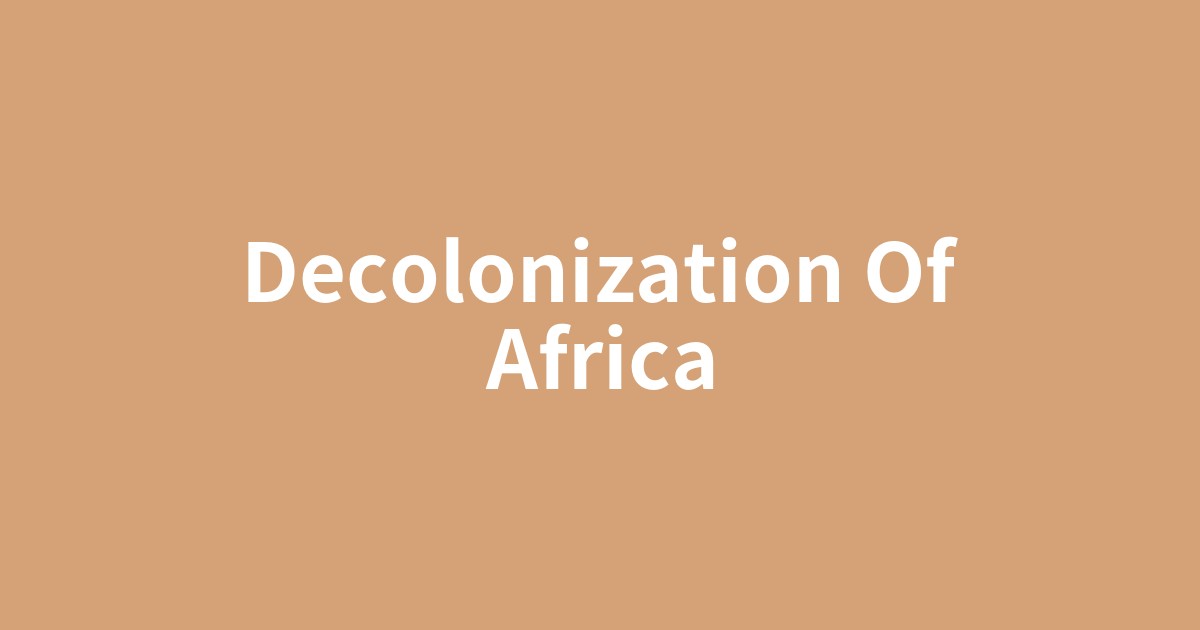このページは、歴史や文化の物語を楽しみながら、その文脈の中で重要な英単語を自然に学ぶための学習コンテンツです。各セクションの下にあるボタンで、いつでも日本語と英語を切り替えることができます。背景知識を日本語で学んだ後、英語の本文を読むことで、より深い理解と語彙力の向上を目指します。

大戦で疲弊した宗主国と、高まる民族自決の機運。1960年の「アフリカの年」に多くの国が独立を達成するまでの、希望と混乱の道のりを追います。
この記事で抑えるべきポイント
- ✓第二次世界大戦が宗主国であるヨーロッパ諸国の国力を著しく疲弊させ、広大な植民地を維持する能力を低下させたという側面。
- ✓大戦に参加したアフリカ出身の兵士たちが「自由」や「平等」の理念に触れ、帰国後に独立運動の担い手となった経緯。
- ✓「民族自決」の原則が国際的な潮流となり、アフリカ諸国の独立要求に正当性を与える追い風となった点。
- ✓1960年の「アフリカの年」に多くの国が独立を達成した一方で、植民地時代に引かれた人為的な国境線などが、独立後の混乱や紛争の一因となった可能性。
- ✓独立はゴールではなく、経済的自立や国民統合といった新たな課題の始まりであり、その影響は現代にも続いているという視点。
第二次世界大戦とアフリカの独立
ヨーロッパ大陸を主戦場とした第二次世界大戦が、なぜ遠く離れたアフリカの運命を劇的に変えたのでしょうか?この問いの答えは、歴史の複雑な綾の中に隠されています。この記事では、宗主国の衰退から「アフリカの年」と呼ばれる独立のうねり、そしてその後に残された光と影まで、アフリカ独立をめぐるダイナミックな歴史の転換点を紐解いていきます。
World War II and African Independence
How did World War II, a conflict primarily fought on the European continent, dramatically alter the fate of faraway Africa? The answer to this question lies within the complex tapestry of history. This article untangles the dynamic turning points of African independence, from the decline of colonial powers to the wave of independence known as the "Year of Africa," and the light and shadows it left behind.
大戦の余波:揺らぐ宗主国の支配体制
第二次世界大戦は、イギリスやフランスといった宗主国(Colonial power)に甚大な経済的・軍事的打撃を与えました。戦勝国とはいえ、その国力は著しく疲弊し、かつて世界に君臨した広大な帝国(empire)を維持する力は大きく削がれていました。この国力の低下は、植民地支配(Colonialism)の物理的な基盤を揺るがし、アフリカにおけるヨーロッパの支配がもはや永続的ではないことを示唆し始めたのです。帝国の威信は地に落ち、植民地の民衆は宗主国の脆弱性を目の当たりにしました。
The Aftermath of War: The Shaky Foundation of Colonial Rule
World War II inflicted immense economic and military damage on colonial powers like Britain and France. Although they were on the victorious side, their national strength was severely depleted, and their ability to maintain the vast empires that once dominated the world was significantly weakened. This decline in power shook the physical foundation of colonialism, suggesting that European rule in Africa was no longer permanent. The prestige of the empire had fallen, and the people of the colonies witnessed the vulnerability of their rulers.
戦場で目覚めた意識:民族自決への希求
枢軸国との戦いのため、宗主国はアフリカの植民地から多くの兵士を動員しました。ヨーロッパの戦線に送られた彼らは、そこで「自由」や「民主主義」といった理念のために戦うという経験をします。同時に、無敵だと思っていた宗主国の兵士たちが、自分たちと同じように傷つき、倒れる姿を目にしました。この経験は、アフリカ人兵士たちの意識を根底から変革します。故郷に戻った彼らは、独立運動を思想的に支える民族自決(Self-determination)への強い希求を抱き、各地で高まるナショナリズム(nationalism)の担い手となっていったのです。
An Awakening on the Battlefield: The Aspiration for Self-Determination
To fight the Axis powers, colonial rulers mobilized many soldiers from their African colonies. Sent to the European front, these soldiers experienced fighting for ideals such as "freedom" and "democracy." At the same time, they saw the soldiers of their supposedly invincible colonial masters get wounded and fall, just like anyone else. This experience fundamentally transformed the consciousness of the African soldiers. Upon returning home, they embraced a strong aspiration for self-determination, which became the ideological backbone of independence movements, and they became the drivers of a rising nationalism.
1960年「アフリカの年」:独立のドミノ現象
戦後、世界はアメリカとソ連を中心とする冷戦構造へと移行し、国際連合が設立されました。国連憲章で謳われた民族自決の原則は、アフリカ諸国の独立要求に国際的な正当性を与える強力な追い風となります。こうした国際情勢の変化を背景に、アフリカ大陸の独立(independence)への機運は一気に高まりました。その象徴が、1960年に17カ国もの国々が相次いで独立を達成した「アフリカの年」です。この歴史的な出来事は、独立のドミノ現象を引き起こし、大陸全土に希望の光を灯しました。
1960, the "Year of Africa": A Domino Effect of Independence
After the war, the world shifted to a Cold War structure centered on the United States and the Soviet Union, and the United Nations was established. The principle of self-determination enshrined in the UN Charter provided a powerful international tailwind, legitimizing the demands for independence from African nations. Against this backdrop of international change, the momentum for independence on the African continent surged. This was symbolized by the "Year of Africa" in 1960, when as many as 17 countries achieved independence in succession. This historic event triggered a domino effect of independence, lighting a beacon of hope across the entire continent.
独立の光と影:人為的な国境という遺産
独立達成という輝かしい成果の裏には、深刻な課題が横たわっていました。その最たるものが、植民地時代に民族や文化、地理的条件を全く無視して引かれた人為的な国境(border)です。この「地図上の線」は、本来共存が難しい民族を一つの国家に閉じ込めたり、逆に一つの民族を複数の国家に分断したりしました。この植民地主義が残した負の遺産(legacy)は、独立後の国家建設において深刻な民族対立や紛争の火種となり、現代に至るまでアフリカの安定を脅かす一因となっています。
The Light and Shadow of Independence: The Legacy of Artificial Borders
Behind the brilliant achievement of independence lay serious challenges. The most significant of these were the artificial borders drawn during the colonial era, which completely disregarded ethnic, cultural, and geographical realities. These "lines on a map" confined historically rival ethnic groups within a single nation or, conversely, divided a single ethnic group among multiple states. This negative legacy of colonialism became a source of intense ethnic conflict and strife in the post-independence nation-building process, and it remains a factor threatening stability in Africa to this day.
結論:未来へ続く道のり
第二次世界大戦は、期せずしてアフリカの脱植民地化(Decolonization)を加速させる触媒となりました。宗主国の衰退、兵士たちの意識変革、そして国際社会の支持という三つの歯車が噛み合った結果、アフリカ諸国は次々と独立を勝ち取ったのです。しかし、独立はゴールではありませんでした。政治的な独立を果たし、国家としての主権(sovereignty)を獲得したものの、経済的自立や国民統合といった真の独立を確立する道のりは、現代アフリカが今なお直面する長く険しい課題と地続きなのです。
Conclusion: The Continuing Journey into the Future
World War II inadvertently acted as a catalyst that accelerated the decolonization of Africa. The confluence of three factors—the decline of colonial powers, the transformed consciousness of soldiers, and the support of the international community—led African nations to win their independence one after another. However, independence was not the final goal. Despite achieving political independence and acquiring national sovereignty, the path to establishing true independence, including economic self-sufficiency and national unity, is a long and arduous one that continues to be a challenge for modern Africa.
テーマを理解する重要単語
empire
イギリスやフランスが築いた広大な植民地支配の領域を指します。第二次大戦によって、この「帝国」を維持する国力が宗主国から失われたことが、アフリカ独立の前提条件でした。この言葉は支配の規模と権威を象徴しています。
文脈での用例:
The Roman Empire was one of the most powerful empires in history.
ローマ帝国は歴史上最も強力な帝国の一つでした。
artificial
「人為的な」という意味で、この記事では宗主国が引いた国境線の不自然さを強調しています。民族や地理を無視した「artificial borders」が、独立後の民族対立の原因となったという文脈で、植民地支配の負の側面を象徴する単語です。
文脈での用例:
The greatest tragedy of the agreement was its artificial borders.
その協定の最大の悲劇は、その人工的な国境にあった。
legacy
過去から現代に受け継がれた、良いものも悪いものも含む「遺産」を意味します。この記事では、植民地主義が残した人為的な国境線という「負の遺産」を指して使われており、独立後のアフリカが抱える紛争の根源を理解する鍵です。
文脈での用例:
The artist left behind a legacy of incredible paintings.
その芸術家は素晴らしい絵画という遺産を残しました。
aspiration
自由や民主主義を知ったアフリカ人兵士たちが抱いた、民族自決への「強い希求」を指します。単なる希望(hope)よりも強い、目標達成への情熱的な想いを表す言葉で、独立運動の精神的な原動力を理解する上で鍵となります。
文脈での用例:
He has a strong aspiration to become a leader for his people.
彼には、自らの民の指導者になりたいという強い熱望があります。
vulnerability
第二次大戦後、宗主国が経済的・軍事的に疲弊し、弱体化した状態を的確に表す単語です。アフリカの人々が宗主国の「脆弱性」を目の当たりにしたことが、独立への意識を高める重要な契機となったと記事は説明しています。
文脈での用例:
The system's main vulnerability is its lack of encryption.
そのシステムの主な脆弱性は暗号化が欠けている点だ。
catalyst
化学反応を促進させる「触媒」から転じて、ある変化を加速させる要因を指します。この記事では、第二次世界大戦が直接の原因ではないものの、アフリカの脱植民地化を「加速させる触媒」として機能した、という歴史の複雑な因果関係を巧みに表現しています。
文脈での用例:
The new law acted as a catalyst for economic reform.
その新しい法律は経済改革の触媒として機能した。
sovereignty
国家が他国からの干渉を受けずに、自国民と領土を統治する最高の権力のことです。記事の結びで、アフリカ諸国は政治的な独立と「主権」は獲得したものの、真の独立にはまだ課題が残る、と論じられており、独立の多面性を理解する鍵です。
文脈での用例:
The nation fought to defend its sovereignty against foreign invasion.
その国は外国の侵略から自国の主権を守るために戦った。
nationalism
共通の民族や文化を基盤に、独立国家の樹立を目指す思想や運動を指します。この記事では、宗主国からの独立を目指すアフリカ各地の動きを支える思想的背景として登場します。民族自決の希求が具体的な運動になった形です。
文脈での用例:
Rising nationalism in the region increased tensions between neighboring countries.
その地域で高まるナショナリズムが、近隣諸国間の緊張を高めた。
colonialism
この記事の中心テーマです。宗主国によるアフリカ支配の体制そのものを指します。この単語を理解することが、第二次大戦がなぜアフリカの「脱植民地化」に繋がったのか、という記事の核心を読み解く第一歩となります。
文脈での用例:
Many African nations gained independence from European colonialism in the mid-20th century.
多くのアフリカ諸国は20世紀半ばにヨーロッパの植民地主義から独立しました。
self-determination
「自分たちの運命は自分たちで決める」という、この記事の思想的な核心をなす概念です。国連憲章にも謳われたこの原則が、アフリカ諸国の独立要求に国際的な正当性を与え、独立運動の強力な追い風となったことを示しています。
文脈での用例:
The treaty ignored the principle of national self-determination.
その条約は民族自決の原則を無視していた。
domino effect
1960年の「アフリカの年」に、一国が独立すると、それが引き金となって次々と他の国も独立していった様子を表現する比喩です。この言葉は、独立の動きが単発ではなく、大陸全体に連鎖的に広がったという歴史のダイナミズムを伝えます。
文脈での用例:
The independence of one nation created a domino effect across the continent.
一国の独立が、大陸全体にドミノ効果を生み出しました。
decolonization
植民地が宗主国の支配から脱し、独立していく歴史的なプロセス全体を指す専門用語です。第二次世界大戦がこの「脱植民地化」を加速させる触媒(catalyst)となった、という記事の結論を要約する非常に重要な概念です。
文脈での用例:
The process of decolonization in Africa accelerated after World War II.
アフリカにおける脱植民地化のプロセスは、第二次世界大戦後に加速した。